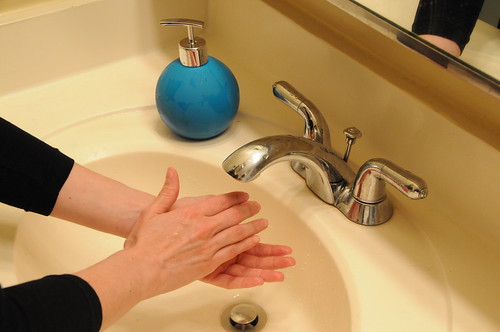While the EPA and the FDA hang in limbo about the possible risks involved with antibacterial products containing triclosan, Minnesota took the decisive step and banned them, becoming the first state to do so. However, the ban will take effect only from January 1, 2017. The law states, “In order to prevent the spread of infectious disease and avoidable infections and to promote best practices in sanitation, no person shall offer for retail sale in Minnesota any cleaning product that contains triclosan and is used by consumers for sanitizing or hand and body cleansing.”

Is your antibacterial soap really cleaning better? From peapod labs.
With the all-pervasive desire to be germ-free, antibacterial, antiseptic, and disinfecting products have been a market success, so the Minnesota legislation against antibacterial products may come as a great surprise to many. However, if you’ve been up and active on the news, the move follows previous reports that antibacterial products create conditions that promote the growth of resistant bacteria, causing more harm than good. According to a study, “Antimicrobial resistance has been an issue since the introduction into clinical use of the first agents in the 1940s.”
Studies also suggest triclosan, an active ingredient in antimicrobial products, has a potential adverse effect on movement in cardiac and skeletal muscle at a cellular level.
Interestingly, the FDA and the EPA report no sure harmful effect of triclosan. The FDA notes on its consumer updates page that “Triclosan is not known to be hazardous to humans.” However, it advises a switch to non-antibacterial soap and water. In fact, in 2005, its advisory panel reportedly concluded that the antibacterial soap does not give any additional benefits over regular soap and water. And on Dec. 16, 2013 a proposal was made “that would require manufacturers to provide more substantial data to demonstrate the safety and effectiveness of antibacterial soaps.”
In 2008, the EPA had run the cyclic check on triclosan and found that “triclosan met the statutory safety standard.” However, it is currently engaged in reassessing triclosan’s effects based on the current data.
The anticipated risks, so far, have been demonstrated on animals with a substantial dose and the FDA tellingly notes, “Animal studies have shown that triclosan alters hormone regulation. However, data showing effects in animals don’t always predict effects in humans.”
Over 2,000 soap products on sale in the country contain triclosan. However, companies are expected to rid them of the ingredient with the mandate. In fact, that seems to be the logic behind the legislation coming into effect in 2017. One of the sponsors of the ban, Senator John Marty predicts “that the odds are good that most manufacturers will phase out triclosan by then anyway.”
And the move sure seems to be working with industries like Avon, Proctor & Gamble, and Johnson & Johnson, who have all announced the removal of triclosan from their products in the interest of public health.